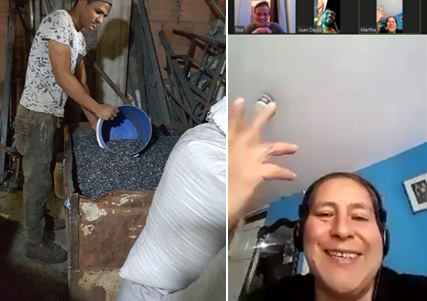“When we came to the city of Bogotá, we were horrified by all the waste we saw on the streets,” Martha Yaneth Rodríguez Mora recalls how she and her husband moved from the countryside of Colombia to the city. Both she and her partner Marco Aurelio David grew up in small towns near Bogotá where their families made a living as farmers. “The air was pure and we were surrounded by the elements of nature. I felt free, without the violence and robberies, and the pollution of the city.” How are Martha and her husband making a change with their recycling business ‘Recuperadora de plástico La Amistad’ in Bogotá?
Coming from a farming family in which she was the only girl, both Martha and her four brothers went to school. Trained as a business administrator she worked her way up to being the manager of a building complex in Bogotá. Martha and her husband had moved to Colombia’s capital in 1993 since there was no work with perspective for them in their home towns and they wanted to look for new opportunities. Working at a flower nursery Marco Aurelio David saw how much plastic was being wasted. With all the plastics he saw on the streets of Bogotá, he put two and two together and decided to start his own recycling business in the early 2000’s.
Family against her joining the recycling business
“At first I did not like this idea of working with other people’s waste,” Martha explains her initial reaction to her husband’s business plan. “But after some time I realized: with recycling I can help people with employment, help the environment and help my two sons with the money we make.” With her family against the idea of her joining the recycling business, Martha made the difficult decision of quitting her well-paid job and start working side by side with her husband in 2008: “I never regretted taking this opportunity.”
Coaching of refugee employees
Now Martha and her husband run their recycling business from their house together with three employees: “We buy plastics at waste centres and we have people working on the streets to collect materials. We have a machine to turn these plastics into new products, such as pipes and tubes we sell to drinking water companies.” Martha is doing the business’ administration and coaches their workers, who as Venezuelan refugees need extra support: “We have a migration crisis in Colombia. At the same time Colombians don’t want to work with waste. So we are happy to take these people on, since it is also very difficult for them to get a job in Bogotá.”
The catastrophe of ending the family company
“It is my dream to expand the business and have the opportunity to hire more employees who need our support. Unfortunately we are facing a lot of problems: because of the pandemic it is difficult to go places to collect plastics. Then there’s the economic crisis, problems with infrastructure, and an unfair tax system which charges low and middle incomes disproportionately high. Also our company has to pay a lot of taxes on services. No, the government doesn’t help us, they don’t consider recycling that important. It would be a catastrophe to end the family company, the dream we worked for all these years.”
Making the community aware of the environment
Despite all these hardships, Recuperadora de plástico La Amistad is making a positive impact every day: on the lives of the employees and their families, towards a circular, more sustainable production system, and on making people more aware of the effect of plastic waste on the environment: “Through our company people in the neighbourhood learn about recycling, they come help classify incoming materials and they start recycling at their own houses,” Martha proudly emphasizes. “I would love for my two sons to continue the business, but I realize they have their own dreams and profession. And as a mother it is my biggest wish that my children can make their own dreams come true,” Martha concludes with a warm hart.
Interviewer and writer: Lisa Koolhoven
Note by the author:
Many thanks to Correspondents of The World and Juan Manuel David Rodríguez for connecting me to Martha, who is Juan’s mother. Juan took it upon him to translate during the interview for his mother and me, while being in Moscow, where he is doing an internship: “I really appreciate the dedication of my mother. Quitting her job was also a chance for her to be close to me and my brother, since we were living in a bad part of town. It is because of her that I am here.”
